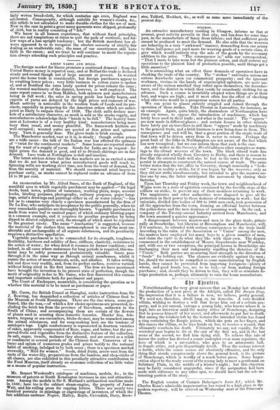Mr. Carne, the British Consul at Shanghai, under instruction from
Sir J. Eowring, has despatched a collection of articles of Chinese food to the Museum at South Kensington. There are the rice wines, some per- fumed, like the teas,—of which a few choice specimens are presented, in- cluding the brick tea from the province of Sze-chuen, unknown in the South of China; and accompanying them are certain of the flowers of plants used in scenting these domestic luxuries. Sharks' fins, fish- maws, trepang or sea-cucumbers, beche-de-mer, may be remarked among the animal substances, and for soup-making here are the tendons of antelope's legs. Light confectionery is represented in fourteen varieties of cakes, apparently compounded of flour, sugar, and butter, but the pre- served fruits and vegetables form the distinctive feature of the collection. In salt, sugar, treacle molasses they abound, and are served as a relish or condiment at severed periods of the Chinese feast. Conserves of to- bacco and opium of numerous grades and prices testify to the national habit of smoking, indulged in by both sexes ; there is a specimen marked avowedly, "Mild for women." Seeds, dried fruits, arrow-root from the roots of the water-lily, preparations from the bamboo, and chop-sticks of all classes, are also exhibited in this peculiarly attractive contribution to the Food Museum, itself already an economic collection of no little value as a means of popular instruction.


























 Previous page
Previous page